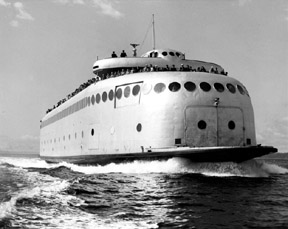Published: December, 2002
For many years, Hercules was organized around one of the world’s largest dynamite manufacturing plants. In the early 1970’s, the Hercules Powder Company plant closed, leaving about 20,000 residents living in the eight square miles of Hercules and lingering remnants of dynamite manufacture. Due to a series of set-backs that drained the City’s budget, including the downturn economy that affected every community, the very survival of Hercules was threatened. But, an ambitious plan launched by the City staff promises to make Hercules into a town with broad-based appeal, not just to Hercules residents, but to Bay Area residents.
Homes Selling Like Hot Cakes
Single-family homes in this waterfront setting begin selling at $450,000 for a modest 1500 square foot home and rise to as high as $650,000. Despite these prices, the homes are being snapped up like hotcakes, with a majority of the planned homes already pre-sold! In addition to single-family homes, plans call for hundreds of live-work units and apartments and at least a dozen affordable townhouses. All told, the new town will offer approximately 1100 residential units.
Located across 167 acres, this impressive project is under construction. The homes that are completed follow an old style Victorian design, complete with porches, big windows, and lots of charm.
New Urbanism
Using a set of principles, which call for a "New Urbanism," citizens of Hercules drew pictures and provided comments that led to the final plan. The resulting development would adhere to the basics of walkable streets, real civic spaces, minimal evidence of automobiles, vibrant retail spaces, diverse commercial use, and a wide selection of housing options.
Bixby Company was chosen from among about 20 bidders to develop the town. According to John Bauke, Bixby Company’s Project Manager, his company’s strength was a good match for the city. Specifically, Bixby specializes in smart-growth, which includes working with underutilized property. In this case, the land parcel, a Brownfield site, had undergone a Superfund clean-up that brought it up to residential standards.
"New urbanism requires greater time, effort and money. But, the resulting product is worth more and the public are willing to pay more for a quality product," Mr. Bauke explained. "In fact," he said, "profits from this project are far exceeding expectations."
On a fast track to final completion by 2007, the town’s vision is quickly taking shape in the form of a new mixed-use district. The site is currently abuzz with bulldozers and planners toting architectural renderings. According to the City Manager, Mike Sakamoto, those bulldozers have been hard at work clearing the land and creating, in various phases, the four distinct subdivisions that comprise this pedestrian-friendly, commercial Town Center. Mr. Sakamoto looks forward to living in his own house that is under construction on the site. He said, "This is an exciting time to be living in Hercules. "
Vice-Mayor Balico described the process of designing the Historic Town Center of the City of Hercules as a planning process that benefited from innovative and extensive public input. "Through a series of public outreach meetings, the people of Hercules helped plan a town that looks like something they’d want to live in," he said.
Water Transit-Oriented Development (WaTOD)
The new Hercules Town Center is located on the Eastern shore of the San Pablo Bay. Like many waterfront communities, such as Sausalito, where the town center is located right at the shoreline, Hercules is ideally suited for water transit-oriented development. Of Bay Area ferry terminals, Sausalito boasts of the highest number of riders who walk to the ferry terminal. Similar to Jack London Square’s layout in Oakland, railroad tracks in Hercules separate the developing Town Center and anticipated parking garage from the assumed location of a ferry terminal.
A new Amtrak station along the shoreline of Hercules is slated to open in 2005, adding to the City’s transit-oriented possibilities. Hercules planners envision a pedestrian bridge crossing the tracks for easy access to a potential ferry terminal. Currently the only other transit serving Hercules is WestCat, a bus service that transports passengers as far as Crockett on one side and the Del Norte BART on the other side of Hercules.
Some of the funding for the ferry terminal may come out of sales tax reauthorizations going to the ballot in 2004 for a funding stream to begin in 2007. The Water Transit Authority has predicted that initial ferry service to Hercules could begin in 2013, but, depending on a variety of factors, it could happen even sooner.


